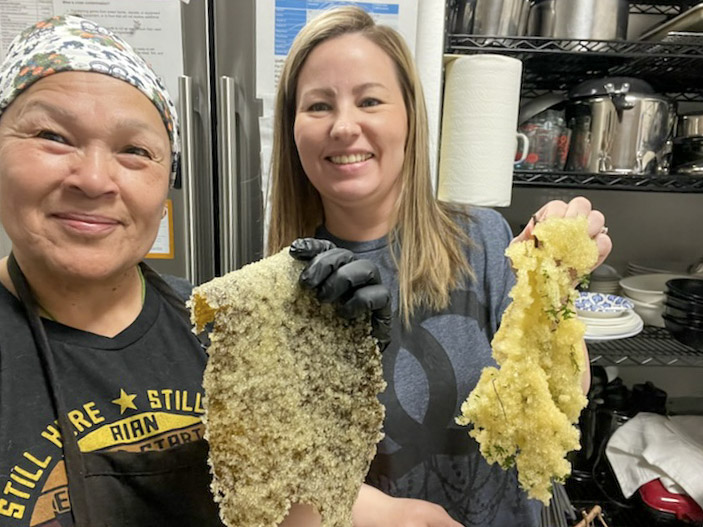Tlingit and Haida cancels food distribution due to federal funding cuts
Springtime is herring egg season in Southeast Alaska. Usually that means that the region’s largest tribal government would be setting up to deliver tens of thousands of pounds of the traditional food to tribal citizens across the region and beyond.
But this year, those distributions won’t happen.
The Central Council of the Tlingit and Haida Indian Tribes of Alaska announced this week that its annual traditional food distributions were canceled this year. In March, the federal government canceled a funding agreement with the tribe.
For the last three years, the tribe distributed herring eggs, salmon and black cod to tribal citizens in each of its recognized communities — from villages in Southeast to cities like Anchorage and Seattle.
But the U.S. Department of Agriculture canceled funding that provided the tribe’s food assistance program. A USDA notice to Tlingit and Haida said that the tribe’s community food distributions “no longer effectuates agency priorities and that termination of the award is appropriate.”
Aaron Angerman is Tlingit and Haida’s food security program manager. He said the community distribution program started in 2022 to promote self-sufficiency, and to reduce reliance on food shipped from the Lower 48.
“Our answer to that, and then our heavy reliance on barge systems and things like that, was to turn back the clock a bit about food sovereignty, which is something that our people have relied on since time immemorial,” he said.
The tribe planned to use more than $500,000 from the USDA for the distribution. The money was allocated to the tribe in January, but USDA sent Tlingit and Haida a notice in March that said the agreement had been canceled.
The money was part of a program called the Local Food Purchase Assistance Agreement which was intended to encourage local governments to buy from farmers and food producers.
And that aligned with the tribe’s goal to keep more traditional foods that are harvested in Southeast Alaska in the fridges and freezers of tribal members.
“For us to be able to take a food that was purchased from commercial vendors, to contract those vendors who are tribal citizens, to keep not only that funding within the tribe and the region,” Angerman said. “But also take a food source that was harvested in our area and typically sent overseas to bring that food back to our people and to be shared.”
The herring egg distribution is special for this reason: because of overfishing and exporting of herring and herring roe, the fish now only spawn in very limited areas.
Angerman said his team is working to get more secure funding. But there’s a lot of other work they are doing to further the understanding and use of traditional foods in the meantime.
“We need to work with elders and those with traditional ecological knowledge to see why and where and how we harvested previously,” he said. “Then to not only do that, but to teach people how to harvest themselves, how to process that food, how to put up or prepare that food.”
Because, he said, if a salmon ends up on someone’s doorstep, and they don’t know how to process it, that isn’t food sovereignty.

Angerman said Tlingit and Haida was able to purchase enough herring eggs to bring to some of their tribally-run and federally-funded Head Start preschool classrooms this year, so the youngest tribal citizens can still learn about the importance of traditional food and land stewardship.
And some distributions in Washington and Oregon will still happen, according to the tribe’s release. The local tribal council in Seattle used different funding sources to set aside money for distributions to reach elders outside of Alaska.

